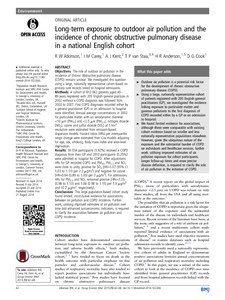Atkinson, RW; Carey, IM; Kent, AJ; van Staa, TP; Anderson, HR; Cook, DG
(2015)
Long-term exposure to outdoor air pollution and the incidence of chronic obstructive pulmonary disease in a national English cohort.
Occupational and Environmental Medicine, 72 (1).
pp. 42-48.
ISSN 1470-7926
https://doi.org/10.1136/oemed-2014-102266
SGUL Authors: Anderson, Hugh Ross Atkinson, Richard William Carey, Iain Miller Cook, Derek Gordon
![[img]](https://openaccess.sgul.ac.uk/107345/1.hassmallThumbnailVersion/Long_term_exposure_outdoor_air_pollution_incidence_chronic_pulmonary_disease.pdf)  Preview |
|
["document_typename_application/pdf; charset=binary" not defined]
Published Version
Download (910kB)
| Preview
|
Abstract
OBJECTIVES: The role of outdoor air pollution in the incidence of chronic obstructive pulmonary disease (COPD) remains unclear. We investigated this question using a large, nationally representative cohort based on primary care records linked to hospital admissions.
METHODS: A cohort of 812 063 patients aged 40-89 years registered with 205 English general practices in 2002 without a COPD diagnosis was followed from 2003 to 2007. First COPD diagnoses recorded either by a general practitioner (GP) or on admission to hospital were identified. Annual average concentrations in 2002 for particulate matter with an aerodynamic diameter <10 µm (PM10) and <2.5 µm (PM2.5), nitrogen dioxide (NO2), ozone and sulfur dioxide (SO2) at 1 km(2) resolution were estimated from emission-based dispersion models. Hazard ratios (HRs) per interquartile range change were estimated from Cox models adjusting for age, sex, smoking, body mass index and area-level deprivation. RESULTS: 16 034 participants (1.92%) received a COPD diagnosis from their GP and 2910 participants (0.35%) were admitted to hospital for COPD. After adjustment, HRs for GP recorded COPD and PM10, PM2.5 and NO2 were close to unity, positive for SO2 (HR=1.07 (95% CI 1.03 to 1.11) per 2.2 µg/m(3)) and negative for ozone (HR=0.94 (0.89 to 1.00) per 3 µg/m(3)). For admissions HRs for PM2.5 and NO2 remained positive (HRs=1.05 (0.98 to 1.13) and 1.06 (0.98 to 1.15) per 1.9 µg/m(3) and 10.7 µg/m(3), respectively).
CONCLUSIONS: This large population-based cohort study found limited, inconclusive evidence for associations between air pollution and COPD incidence. Further work, utilising improved estimates of air pollution over time and enhanced socioeconomic indicators, is required to clarify the association between air pollution and COPD incidence.
| Item Type: |
Article
|
| Additional Information: |
Published by the BMJ Publishing Group Limited. This is an Open Access article distributed in accordance with the Creative Commons Attribution Non Commercial (CC BY-NC 4.0) license, which permits others to distribute, remix, adapt, build upon this work non-commercially, and license their derivative works on different terms, provided the original work is properly cited and the use is non-commercial. See: http://creativecommons.org/licenses/by-nc/4.0/ |
| Keywords: |
Environmental & Occupational Health, 1103 Clinical Sciences, 1117 Public Health And Health Services, 1599 Other Commerce, Management, Tourism And Services |
| SGUL Research Institute / Research Centre: |
Academic Structure > Population Health Research Institute (INPH) |
| Journal or Publication Title: |
Occupational and Environmental Medicine |
| ISSN: |
1470-7926 |
| Language: |
eng |
| PubMed ID: |
25146191 |
| Web of Science ID: |
WOS:000346359600009 |
| Dates: |
| Date |
Event |
| 2015-01 |
Published |
|
 |
Go to PubMed abstract |
| URI: |
https://openaccess.sgul.ac.uk/id/eprint/107345 |
| Publisher's version: |
https://doi.org/10.1136/oemed-2014-102266 |
Statistics
Item downloaded times since 04 Mar 2015.
Actions (login required)
 |
Edit Item |



